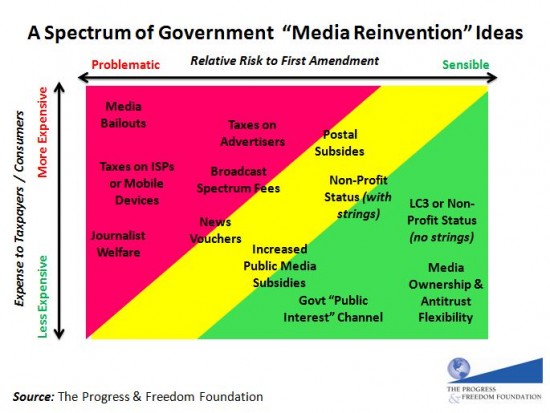As I've noted here before, the Federal Trade Commission (FTC) has an ongoing proceeding asking "How Will Journalism Survive the Internet Age?" The agency has hosted two workshops on the issue and a third is scheduled for June 15th at the National Press Club. Recently, the FTC released a 47-page staff discussion draft entitled "Potential Policy Recommendations to Support the Reinvention of Journalism," which outlines dozens of proposals that have been set forth in recent years to "save journalism," "reinvent media," or support various forms of so-called "public interest programming." [I've embedded the document down below.] Although the FTC makes it very clear on the first page of the discussion draft that it "does not represent final conclusions or recommendations by the Commission or FTC staff [and] it is solely for purposes of discussion," the document is drawing scrutiny and raising concern since it might foreshadow where the FTC (and Obama Administration) could be heading on this front.
Some of those raising a stink about the FTC draft include: Jeff Jarvis ("FTC Protects Journalism's Past"); Rob Port ("Federal Government Considering "iPad Tax" To Subsidize Journalism"); Mark Tapscott: "(Will Journalists Wake up in Time to Save Journalism from Obama's FTC?"); and Andrew Malcolm of the Los Angeles Times ("Obama's FTC Plan to Reinvent America's News Media"), who says, "this FTC study is rated R for anyone who thinks the federal government, the object of copious news coverage itself, has no business deciding which sectors of the private media business survive and thrive through its support, subsidies and encouragement with things like tax incentives. Yet that's what this Obama administration paper is suggesting as another of the ex-community organizer's galactic reform plans." Ouch!
I've spent a great deal of time considering many of the "reform" proposals that the FTC outlines in its discussion draft and, along with Berin Szoka, recently released a 5-part series of papers and filed 80 pages of comments with the Federal Communications Commission (FCC) in its "Future of Media" proceeding, which shares much in common with the FTC's "Will Journalism Survive?" proceeding. Not all of the ideas floated in the FTC's draft document are toxic, but some are very troubling and fit squarely in the red or yellow zone of that chart above, which plots a range of media policy options that the FTC or FCC might pursue.
As the FTC draft is structured currently, it appears to have been heavily influenced by the radical activist group Free Press and its founder Robert McChesney, the prolific neo-Marxist media scholar from the University of Illinois. I've explained in detail here before the dangerous ideas floated by McChesney and Free Press. For background, see:
- Free Press, Robert McChesney & the "Struggle" for Media, Aug. 2009
- A "Public Option" for Media? The Free Press Plan to Put Journalists on the Public Dole, Nov. 2009
- What the Media Reformistas Really Want, Aug. 2008
- Socializing Media in Order to Save It, March 2009
For some reason, the FTC seems enamored with these dangerous ideas. McChesney and Free Press are cited over a dozen times and their proposals show up almost verbatim throughout the FTC's discussion draft. Moreover, McChesney was recently invited to one of the FTC's workshops to deliver a major address on these issues. Finally, what makes me particularly nervous is that Susan DeSanti, the person running the FTC's effort, has praised McChesney and Nichols' "excellent book" despite its call for radical steps that would essentially hobble private media and impose crushing taxes on just about everyone in sight to subsidize public, state-blessed media.
I sincerely hope that the FTC's "discussion draft" is just that, and nothing more. I'm fine with discussing kooky Marxist ideas all day long. I just hope our government isn't getting ready to start imposing them upon us.
